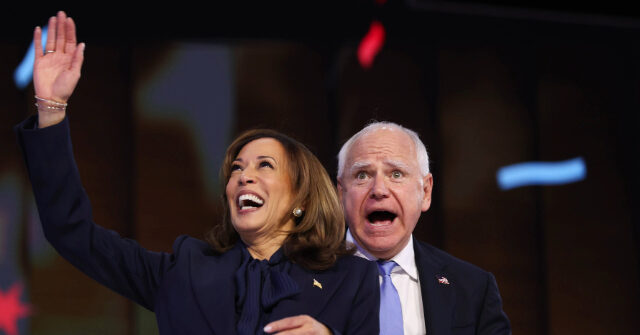
31 Questions Dana Bash Should Ask Kamala Harris, Tim Walz in First Interview
Democrat presidential and vice presidential nominees Vice President Kamala Harris and Minnesota Gov. Tim Walz are set to engage in their first sit-down interview on Thursday with CNN, more than a month after Harris became the presumptive nominee.
Here are 31 questions, broken down by larger themes, that CNN’s Dana Bash could and should ask the duo during the joint interview:
ECONOMY:
1. Price controls typically result in shortages. Are your price control proposals for groceries not going to just create empty aisles and shelves?
2. Will providing every first-time home buyer with $25,000 cause the prices of homes to soar by a similar amount, rendering such an effort futile?
3. Would a 28 percent corporate tax rate, as your campaign has pushed, drive more American business abroad by discouraging investment within the United States?
4. Why have you changed your position on fracking? Does this undermine the Green agenda that the Biden-Harris administration has emphatically embraced?
5. Do you see a correlation between your administration’s and the Democrat-controlled 117th Congress’s substantial spending and the 40-year high inflation that crippled working-class and middle-class Americans?
6. Why do you claim former President Donald Trump will slash Medicare and Social Security when the Biden-Harris administration is moving to cut Medicare Advantage?
7. In the past, you supported the president’s policy to mandate that car makers produce a significantly larger share of electric vehicles (EVs). Do you still support an EV mandate?
8. Do you support strong tariffs to protect American workers and domestic industries, including the auto industry and the steel industry?
IMMIGRATION:
9. Have you visited the border yet? If not, why not?
10. Do you support a border wall? If not, what is the best argument against a border wall?
11. Does immigration raise the standard of living for middle-class Americans?
12. Allowing in how many immigrants per year is best for Americans?
13. Does immigration help companies raise the productivity of blue-collar and white-collar Americans?
14. Does immigration raise housing costs and rent?
15. Do you support decriminalizing illegal entry into the United States?
16. The Democrat-controlled State Senate in your (Harris’s) home state of California just passed a bill that will provide up to $150,000 in home loans for illegal aliens who are first-time home buyers. Do you support this move?
FREEDOM:
17. Your party has claimed the mantle of “defending democracy,” but you were appointed as your party’s nominee despite never having received any vote as a presidential candidate in any primary. In what way did your nomination process reflect democracy?
18. How can you reconcile this message of “freedom” when Mark Zuckerberg said the Biden-Harris White House actively pressured Facebook to censor Americans?
FOREIGN POLICY:
19. Would you do anything differently than President Joe Biden to negotiate the release of the Gaza hostages and put an end to the war? If not, why do you think the same policy that has failed under Biden would work under you?
20. Do you see Israel as immoral?
21. You have said the United States will support Ukraine “as long as it takes.” What are your plans to continue to aid Ukraine? Does this mean sending U.S. taxpayer dollars to Ukraine for all four to eight years of your presidency if you see it necessary?
22. Is there a fixed limit in your mind of how many U.S. taxpayer dollars should go to Ukraine, or is your sentiment: as many tax dollars as it takes?
23. Donald Trump and Volodymyr Zelensky have a longstanding productive relationship, similar backgrounds as entertainment figures turned outsider politicians, and Zelensky was a key figure in the undoing of the failed Democrat attempt to impeach Trump. Why do you think you would have a better relationship with him than Trump did as president?
24. What is your plan to help Ukraine win the war? Is it realistic without causing a larger conflict between the United States and Russia?
25. Would your policies further drive Russia into China’s hands?
26. You omitted any discussion of China in your Democratic National Convention (DNC) address and do not have any concrete policy stated on our relationship with Beijing. Do you consider containing Chinese communist influence a priority? Do you consider China an enemy of America?
QUESTIONS FOR WALZ:
27. Why have you repeatedly misrepresented your military service, including the rank with which you retired and the false claim that you carried weapons of war “in war?”
28. Retired Army Command Sergeant Major Doug Julin said that, in March 2005, you pledged to go “forward with” your battalion into Iraq, but, by May 2005, you had retired. What made you change your mind?
29. You ran a hotline for Minnesotans to report their neighbors who violated your lockdown orders during the coronavirus pandemic. How is that compatible with your mantra of “Mind your own damn business?”
30. Do you think parents should have a legal say in whether their minor children are put on hormone blockers and given irreversible transgender surgery? Or should the state intervene to stop parents from objecting?
31. Do you have any regrets about not doing more to protect your state’s citizens and their small businesses from the violence that engulfed Minneapolis during the 2020 Black Lives Matter (BLM) protests?
Originally Posted At www.breitbart.com
Stay Updated with news.freeptomaineradio.com’s Daily Newsletter
Stay informed! Subscribe to our daily newsletter to receive updates on our latest blog posts directly in your inbox. Don’t let important information get buried by big tech.
Current subscribers:








